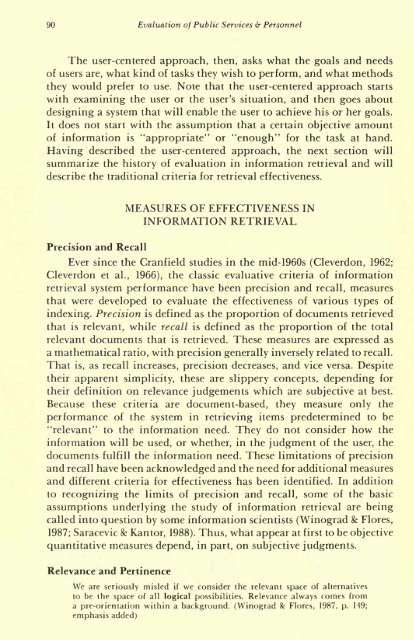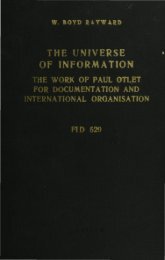User-Centered Evaluation of Information Retrieval - ideals
User-Centered Evaluation of Information Retrieval - ideals
User-Centered Evaluation of Information Retrieval - ideals
Create successful ePaper yourself
Turn your PDF publications into a flip-book with our unique Google optimized e-Paper software.
90 <strong>Evaluation</strong> <strong>of</strong> Public Services b Personnel<br />
The user-centered approach, then, asks what the goals and needs<br />
<strong>of</strong> users are, what kind <strong>of</strong> tasks they wish to perform, and what methods<br />
they would prefer to use. Note that the user-centered approach starts<br />
with examining the user or the user's situation, and then goes about<br />
designing a system that will enable the user to achieve his or her goals.<br />
It does not start with the assumption that a certain objective amount<br />
for the task at hand.<br />
<strong>of</strong> information is "appropriate" or "enough"<br />
Having described the user-centered approach, the next section will<br />
summarize the history <strong>of</strong> evaluation in information retrieval and will<br />
describe the traditional criteria for retrieval effectiveness.<br />
MEASURES OF EFFECTIVENESS IN<br />
INFORMATION RETRIEVAL<br />
Precision and Recall<br />
Ever since the Cranfield studies in the mid-1960s (Cleverdon, 1962;<br />
Cleverdon et al., 1966), the classic evaluative criteria <strong>of</strong> information<br />
retrieval system performance have been precision and recall, measures<br />
that were developed to evaluate the effectiveness <strong>of</strong> various types <strong>of</strong><br />
indexing. Precision is defined as the proportion <strong>of</strong> documents retrieved<br />
that is relevant, while recall is defined as the proportion <strong>of</strong> the total<br />
relevant documents that is retrieved. These measures are expressed as<br />
a mathematical ratio, with precision generally inversely related to recall.<br />
That is, as recall increases, precision decreases, and vice versa. Despite<br />
their apparent simplicity, these are slippery concepts, depending for<br />
their definition on relevance judgements which are subjective at best.<br />
Because these criteria are document-based, they measure only the<br />
performance <strong>of</strong> the system in retrieving items predetermined to be<br />
"relevant" to the information need. They do not consider how the<br />
information will be used, or whether, in the judgment <strong>of</strong> the user, the<br />
documents fulfill the information need. These limitations <strong>of</strong> precision<br />
and recall have been acknowledged and the need for additional measures<br />
and different criteria for effectiveness has been identified. In addition<br />
to recognizing the limits <strong>of</strong> precision and recall, some <strong>of</strong> the basic<br />
assumptions underlying the study <strong>of</strong> information retrieval are being<br />
called into question by some information scientists (Winograd & Flores,<br />
1987; Saracevic 8c Kantor, 1988). Thus, what appear at first to be objective<br />
quantitative measures depend, in part, on subjective judgments.<br />
Relevance and Pertinence<br />
We are seriously misled if we consider the relevant space <strong>of</strong> alternatives<br />
to be the space <strong>of</strong> all logical possibilities. Relevance always comes from<br />
a pre-orientation within a background. (Winograd & Flores, 1987, p. 149;<br />
emphasis added)
















